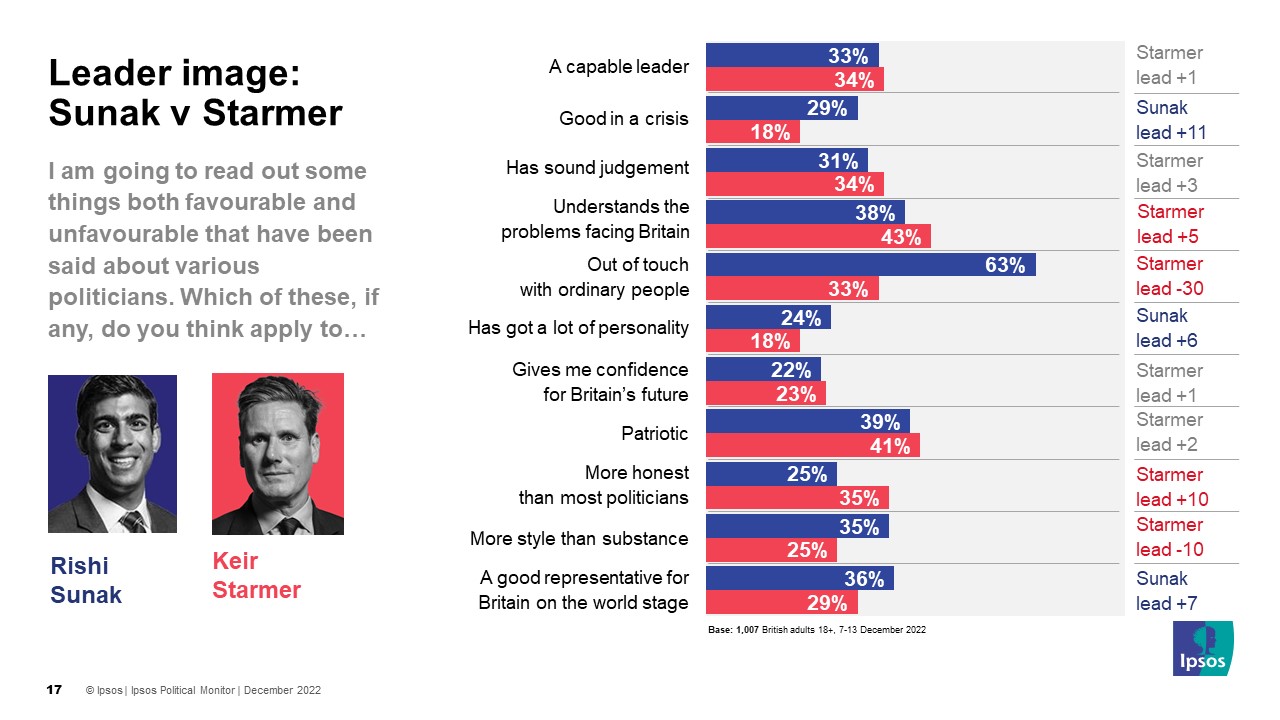Conservatives no longer most trusted to grow Britain’s economy
- Labour more trusted to reduce cost of living and manage immigration
- Dissatisfaction with Rishi Sunak as PM grows, but little to choose between him and Keir Starmer on detailed leader image attributes
The December Ipsos Political Monitor, taken 7-13 December shows in the aftermath of the September mini-Budget and November Autumn Statement, and amidst ongoing industrial unrest, the Conservatives have lost their lead over Labour on which party is most trusted to grow the British economy.
Trust on the economy and other issues
When asked which party the public trust most to grow Britain’s economy, 29% of Britons trust the Conservatives and 29% trust Labour (28% say no party or don’t know). In September this year (before the mini-budget) the Conservatives led by 42% to 27%, and had been in front throughout 2022 before then.
 Meanwhile, on other issues:
Meanwhile, on other issues:
- 37% trust Labour most to reduce the cost of living (-3 points from September) and 19% trust the Conservatives most (-6). 32% say no party or don’t know.
- 28% trust Labour to manage immigration (+1), 19% trust the Conservatives most (-6). 36% say no party or don’t know.
Voting intention
Labour leads the Conservatives by 26 points:
- Labour 49% (+1 since November)
- Conservatives 23% (-6)
- Lib Dems 13% (+6)
- Greens 3% (no change)
- Other 11% (+1).
Do the Conservatives deserve to be re-elected / Are Labour ready for government?
- 61% disagree the Conservatives deserve to be re-elected (+1 from October) while 19% think they do (-3). 31% felt they deserved to be re-elected around the time Boris Johnson indicated he planned to leave office in July.
- 47% think Labour are ready to form the next government (no change from October) and 31% disagree (-1). The 47% who agree Labour is ready is the joint highest score registered by Labour since losing office in 2010.
Leader / government satisfaction ratings
28% are satisfied with the job Rishi Sunak is doing as Prime Minister (-1 from November) and 49% are dissatisfied (+12).
- 64% of Conservative voters are satisfied with Sunak’s job performance (-2) and 19% are dissatisfied (+7).
36% are satisfied with the job Keir Starmer is doing as Labour leader and 42% are dissatisfied (no change on either measure).
- 55% of Labour voters are satisfied with the job Keir Starmer is doing (-2) and 29% are dissatisfied (+1).
Just 14% are satisfied with how the government is running the country (-2 points from November) and 79% are dissatisfied (+3).
Leader attributes
When asked whether a series of 11 personality traits applied to Rishi Sunak and Keir Starmer, our data shows:
Keir Starmer leads Sunak by 5 points or more on:
- Understands problems facing Britain 43% vs 38%
- More honest than most politicians 35% vs 25%
- He is also less likely to be associated with negative traits of being out of touch with ordinary people (by 33% to 63%) and more style than substance (25% to 35%).
Rishi Sunak leads Keir Starmer by 5 points or more on:
- Good in a crisis 29% vs 18%
- Has got lots of personality 24% vs 18%
- A good representative for Britain on the world stage 36% vs 29%
This means Sunak and Starmer are virtually tied on:
- Capable leader Starmer 34% / Sunak 33%
- Sound judgement Starmer 34% / Sunak 31%
- Gives me confidence for Britain’s future Starmer 23% / Sunak 22%
- Patriotic Starmer 41% / Sunak 39%

Gideon Skinner, Head of Political Research at Ipsos UK, says of the findings:
“As we go into Christmas there’s little sign of any significant honeymoon for Rishi Sunak in these figures. His personal ratings are down – before recent occupants of No10 it was rare for Prime Ministers to be in negative territory so early on in their tenure – while Labour continue to hold a substantial lead in voting intentions. Keir Starmer’s personal scores are mixed and there is not much to choose between him and the Conservative leader on many leader attributes, but despite this Britons are more inclined to see Labour as ready for government than during most of the last 10 years. Underpinning much of this are voters’ views on the economy and cost of living, which have been top of their agenda for most of 2022. The challenge for the Conservatives going into 2023 is that they still haven’t regained public confidence on these key issues, nor in other important areas like public services and immigration – and looking ahead few think the party deserves to be re-elected.”
Technical note
Ipsos interviewed a representative sample of 1,007 adults aged 18+ across Great Britain. Interviews were conducted by telephone: 7th to 13th December 2022. Data are weighted to match the profile of the population. All polls are subject to a wide range of potential sources of error. On the basis of the historical record of the polls at recent general elections, there is a 9 in 10 chance that the true value of a party’s support lies within 4 points of the estimates provided by this poll, and a 2 in 3 chance that they lie within 2 points. This is especially important to keep in mind when calculating party lead figures.
To find our Political Monitor trends, including interactive visualizations, please click here.






